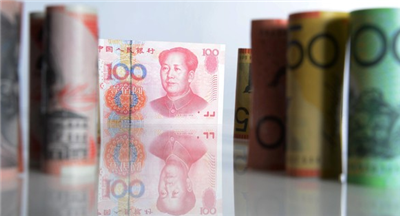(单词翻译:单击)
The internationalisation of China’s renminbi faces its stiffest test yet as the International Monetary Fund debates whether to endorse the “redback” as a reserve currency alongside the dollar, euro, yen and sterling.
国际货币基金组织(IMF)正在就是否接纳中国的人民币,将其作为美元、欧元、日元和英镑之外的储备货币开展辩论。这一争论令这种“红色底色”货币的国际化进程面临有史以来的最严峻考验。
Becoming a constituent in the IMF’s Special Drawing Rights basket would be a big step forward for the currency, which remains tightly controlled by Beijing. Economist Louis Gave of GaveKal Dragonomics likens the move to Japan’s currency liberalisation in the 1980s and the subsequent run-up in yen assets.
对于依然受到中国政府严格控制的人民币来说,加入IMF特别提款权(Special Drawing Rights)货币篮子将是一大进展。龙洲经讯(Gavekal Dragonomics)经济学家路易斯•加夫(Louis Gave)把这一事件与上世纪80年代日本货币汇率的自由化及日元资产随后的上涨相比拟。
“Very quickly, global equity and bond investors were chasing their own tails, pushing up the value of the yen together with Japanese equity and bond valuations to regular new highs.” (From which, of course, they subsequently retreated as the bubble imploded.)
“在极短时间内,全球股市和债券投资者就进入了自我推升的循环之中,将日元汇率连同日本股票及债券的价格,推升至新的一贯性的高点。”(当然,随着泡沫的破裂,它们后来已从这一高点回落。)
However, the rewards for Beijing would be more than simply financial: acquiring SDR rights would be a powerful boost to its geopolitical ambitions.
不过,对于中国政府来说,由此带来的回报或许不仅仅在金融方面:获得特别提款权,可能会大大提升中国政府的地缘政治野心。
“For China, SDR basket inclusion is symbolic to global recognition of its rise in status,” Paul Mackel, head of Asia forex research at HSBC, wrote in a recent report. “The very stringent requirements for currency inclusion in the SDR serve as a quality assurance to global users that the currency in question is indeed very liquid and stable as a store of value.”
汇丰银行(HSBC)亚洲外汇研究部门主管保罗•梅克尔(Paul Mackel)最近在一份报告中写道:“对中国来说,人民币加入特别提款权货币篮子,是中国地位获得全球认可的一种象征。货币纳入特别提款权需要满足非常严格的要求。这种要求对全球用户来说是一种品质上的保证,表示他们关心的货币作为价值储存手段确实具备非常好的流动性和稳定性。”
That will feed into the IMF’s deliberations. “The crux of the matter is that this is ultimately going to be decided on political rather than economic merits,” says Eswar Prasad, economics professor at Cornell University and former China country director for the IMF.
这一事实令IMF在这个问题上愈发谨慎。曾任IMF中国事务主管的康奈尔大学(Cornell University)经济学教授埃斯瓦尔•普拉萨德(Eswar Prasad)表示:“这件事的症结在于,此事最终将由政治决定,而不是由经济收益决定。”
China’s bid for more influence in the international monetary system began at the peak of the global financial crisis in March 2009, when central bank governor Zhou Xiaochuan published a paper in English titled “Reform the international monetary system”.
中国扩大在国际货币系统影响力的企图,始于2009年3月全球金融危机的顶峰时期。当时,中国央行(PBoC)行长周小川曾发表一篇论文,题目是《关于改革国际货币体系的思考》(Reform the international monetary system)。
Mr Zhou argued that the global financial crisis had exposed the vulnerabilities of over-reliance on the dollar, and proposed beefing up the SDR so it could serve as “an international reserve currency that is disconnected from individual nations”.
周小川声称全球金融危机暴露了过度依赖美元的脆弱性,并提议加强特别提款权机制,确保它能成为“一种与主权国家脱钩、并能保持币值长期稳定的国际储备货币”。
In March this year Chinese Premier Li Keqiang told IMF managing director Christine Lagarde that China intended to accelerate reforms needed to meet the criteria for SDR inclusion.
今年3月,中国总理李克强曾向IMF总裁克里斯蒂娜•拉加德(Christine Lagarde)表示,中国打算加快实施必要的改革,以便让人民币能够满足被特别提款权接纳的评价标准。
The IMF board will vote in November or December. Ahead of that, a staff review this month will assess the renminbi’s suitability based on four criteria.
今年11月或12月,IMF董事会将开展投票。在那之前,IMF将于本月发布一份员工评估,基于四大标准评估人民币是否适合纳入特别提款权。
The first three — transaction volume in foreign exchange spot markets; transaction volume in forex derivatives markets; and use of the currency by central banks as reserves — are partly subjective, says Mr Prasad. So long as the renminbi is widely used, the IMF could determine that the criteria have been met, even if the renminbi ranks even lower than other non-SDR currencies on one or more measure.
前三项标准是外汇现货市场的成交量、外汇衍生品市场的成交量以及把人民币用作储备货币的央行数。普拉萨德表示,这三项标准在一定程度上是客观的。只要人民币得到广泛应用,即使人民币在其他一个或几个方面排名低于其他非特别提款权货币,IMF也会判定上述标准已经满足。
The fourth hurdle, which essentially requires a yes or no decision on whether renminbi interest rates are market-based, will be much harder to clear.
至于第四项标准,实质上是要求明确判定人民币利率是否由市场决定。这一标准的通过难度要大得多。
Mr Zhou said in March that China may eliminate the administrative cap on bank deposit rates — the last interest rate in China subject to government control — by the end of this year. That might provide the opening IMF board members need to admit China into the SDR club.
今年3月,周小川曾表示,中国可能会在年底以前,废除银行存款利率的行政上限——这是中国受到政府控制的最后一种利率。此举或许会为IMF董事会批准中国加入特别提款权俱乐部打开大门。
But the US is likely to push back by urging the IMF to interpret its rules strictly and arguing for the SDR to be used as an incentive to press for greater financial liberalisation.
不过,美国很可能会抵制这一结果。他们可能会敦促IMF更严格地解释其相关规定,并可能辩称特别提款权应该被用作一种迫使中国提高金融自由化程度的激励手段。
Mr Zhou’s statement leaves ample flexibility to delay freeing up deposit rates if economic conditions change — a scenario that looks increasingly plausible.
周小川的声明留下了很大的发挥余地,如果经济状况发生改变,中国或许会推迟放开存款利率。目前看来,这种情况发生的可能性越来越大。
China has cut benchmark interest rates twice since November in a bid to reduce financing costs for businesses amid a slowing economy. Removing the deposit-rate cap would probably have the opposite effect, pushing rates higher as banks compete for funds.
自去年11月以来,中国已两次下调基准利率,试图在经济放缓之际降低企业的融资成本。废除存款利率上限可能会起到反作用,令银行在揽储过程中推高利率。
“We believe that the RMB’s inclusion in the SDR (and indeed RMB internationalisation itself) is being used mainly as a goalpost, to catalyse domestic financial sector reforms, especially interest rate liberalisation and China’s capital account opening,” Tao Wang, UBS China economist, wrote recently.
最近,瑞银(UBS)中国问题经济学家汪涛曾写道:“我们认为,特别提款权对人民币的接纳问题主要是用来设定一个努力的方向,以便加快国内的金融改革,特别是在利率自由化和放开中国资本账户方面的改革。”
The fund has already signalled its approval of recent reforms to loosen the government’s tight grip on the currency. Markus Rodlauer, deputy director of the IMF’s Asia-Pacific department, said during Ms Lagarde’s visit that the renminbi exchange rate was “moving toward equilibrium”, a shift in tone from the fund’s longstanding assessment that the exchange rate is “undervalued”.
目前,IMF已发出信号,表达对中国政府近期实施多项改革、放松对货币严格管控的赞赏。在拉加德访华期间,IMF亚太部门副主任马库斯•罗德劳尔(Markus Rodlauer)曾表示人民币汇率正“趋近平衡点”。比起IMF长期以来人民币汇率“被低估”的评价,上述说法在口风上出现了转变。
IMF rules require a review of the SDR basket at least every five years but more frequent reviews are permitted. That leaves open the possibility of a compromise in which the IMF decides the renminbi is close to meeting the relevant criteria but still falls short, and schedules another review sooner than 2020.
按照IMF的规定,至少每五年要评估一次特别提款权的货币篮子,不过评估的频率可以高于五年一次。这为IMF以一种妥协方式处理这个问题创造了可能性。也就是说,IMF可能会认定人民币接近达标但仍有欠缺,并安排在2020年以前再次评估人民币。
However, such a move would not be without risk.
但是,这么做也不是毫无风险。
“It will be seen as a slap in Beijing’s face if the IMF chooses to punt on this issue now,” says Mr Prasad. “That would really poison the relationship between the IMF and China.”
普拉萨德表示:“目前,如果IMF选择回避这个问题,会被视为对中国政府的打脸。这或许会大大伤害IMF与中国之间的关系。”


